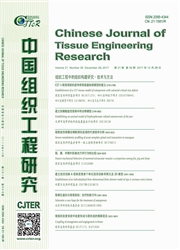

 中文摘要:
中文摘要:
背景:聚乳酸是经FDA批准可进入人体的生物可降解材料,因其表面疏水性强,与细胞亲和力差,所显示的生物相容性较差。目的:观察MC3T3-E1成骨前体细胞在马来酸酐改性聚乳酸和丁二胺改性聚乳酸表面的黏附情况,评价改性聚乳酸的细胞相容性,并与聚(DL-乳酸)对比。设计、时间及地点:对比实验,于2007-06在重庆大学生物工程学院生物材料与仿生工程研究中心完成。材料:聚(DL-乳酸)、马来酸酐改性聚乳酸和丁二胺改性聚乳酸为自制;MC3T3-E1细胞株购自上海细胞生物研究所。方法:采用体外培养细胞的方法,将MC3T3-E1细胞直接接种到聚(DL-乳酸)、马来酸酐改性聚乳酸和丁二胺改性聚乳酸材料上。主要观察指标:通过细胞形态、细胞增殖、细胞周期、细胞黏附检测比较不同基底材料对MC3T3-E1成骨前体细胞的影响。结果:MC3T3-E1成骨前体细胞在马来酸酐及丁二胺改性聚乳酸膜上的增殖速率和黏附力大于聚(DL-乳酸)(P〈0.05);细胞周期测定显示马来酸酐及丁二胺改性聚乳酸膜能促进MC3T3-E1成骨前体细胞从G0期向S期和G2/M期过渡,细胞形态也较为成熟。结论:马来酸酐改性的聚乳酸和丁二胺改性的聚乳酸能促进MC3T3-E1成骨前体细胞黏附、增殖,并促进其更迅速地从成骨前体细胞向成骨细胞分化,具有比聚乳酸更好的细胞相容性。
 英文摘要:
英文摘要:
BACKGROUND: With the FDA certification, poly(DL-lactic acid) (PDLLA) is a kind of bio-degradable materials that can enter the human body, but its biocompatibility is relatively bad due to strong surface hydrophobicity and weak cellular affinity. OBJECTIVE: To observe the adhesion of MC3T3-E1 osteoblasfic progenitor cells to maleic anhydride-grafted PDLLA (MPLA) and tetramethylenediamine-grafted PDLLA (DPLA), evaluate the cytocompatibility of modified PDLLA, and compare with PDLLA. DESIGN, TIME AND SETTING: A controlled trial was carried out in the Research Center of Bioinspired Material Science and Engineering, College of Bioengineering, Chongqing University in June 2007. MATERIALS: PDLLA, MPLA and DPLA were all self-made; MC3T3-E1 cell strain was purchased from Shanghai Institute of Cell Biology. METHODS: By means of in vitro culture, MC3T3-E1 cells were inoculated on PDLLA, MPLA and DPLA. MAIN OUTCOME MEASURES: The influence of different substrate materials on MC3T3-E1 osteoblastic progenitor cells was detected through cell morphology, cell proliferation, cell cycle and cell adhesion. RESULTS: The proliferation and adhesion of MC3T3-E1 osteoblastic progenitor cells on DPLA and MPLA were greater than those on PDLLA (P 〈 0.05); Cell cycle determination revealed that, DPLA and MPLA could promote the MC3T3-EI osteoblastic progenitor cells from Go phase to S phase and G2/M phase, and the cell morphology was more mature. CONCLUSION: Modification of PDLLA by DPLA and MPLA can promote the adhesion and proliferation of MC3T3-E1 osteoblastic progenitor cells, and facilitate the differentiation from osteoblastic progenitor cells to osteoblasts with the better cytocompatibility than PDLLA.
 同期刊论文项目
同期刊论文项目
 同项目期刊论文
同项目期刊论文
 期刊信息
期刊信息
